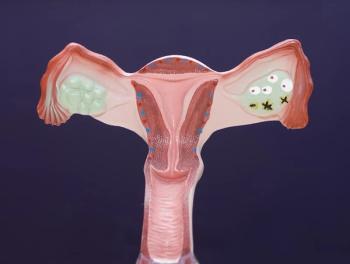
Miami Breast Cancer Conference® Abstracts Supplement
- 40th Annual Miami Breast Cancer Conference® - Abstracts
- Volume 37
- Issue suppl 4
- Pages: 12-13
7 EMERALD Phase 3 Trial of Elacestrant Versus Standard-of- Care Endocrine Therapy in Patients With ER+/HER2– Metastatic Breast Cancer: Updated Results by Duration of Prior CDK4/6i in Metastatic Setting
Background
The EMERALD trial demonstrated significantly prolonged PFS and a manageable safety profile for elacestrant vs SoC ET in pts with ER+/HER2− mBC following progression on prior ET and CDK4/6i therapy. Here, we examine the impact of duration of prior CDK4/6i on PFS.
Materials and Methods
EMERALD is a randomized, open-label, phase 3 trial that enrolled pts with ER+/HER2− MBC who previously had 1-2 lines of ET, mandatory CDK4/6i, and ≤1 chemotherapy; prior treatment with fulvestrant was allowed. Pts were randomized 1:1 to elacestrant 400 mg QD or SoC (investigator’s choice of aromatase inhibitor or fulvestrant). If randomized to the control arm, pts who received prior fulvestrant were to receive an aromatase inhibitor, and vice versa. If 2 CDK4/6i were used in the metastatic setting (n = 40), the cumulative duration was calculated.
Results
A total of 478 pts were randomized (228 with ESR1m) between Feb 2019–Oct 2020 (n = 239, elacestrant; n = 239, SoC). OS data were not yet mature as of September 2, 2022. Updated PFS results show statistically significant results in favor of elacestrant, both in all pts and in pts with ESR1m. Duration of prior CDK4/6i in the metastatic setting was positively associated with PFS; the longer the duration of prior CDK4/6i in the metastatic setting (n = 465), the longer the PFS on elacestrant vs SOC.
Conclusions
Elacestrant demonstrated longer PFS vs SOC that was positively associated with the duration of prior treatment with CDK4/6i, which was more pronounced in pts with ESR1m MBC. In this 2nd- and 3rd-line setting, elacestrant was well tolerated with significantly longer PFS vs SoC, highlighting its potential role as a therapeutic option for pts with ER+/ HER2− mBC.
AFFILIATIONS:
Aditya Bardia,1* Francois Clement Bidard,2* Patrick Neven,3 Alberto Montero,4 Joo Hyuk Sohn,5 Philippe Aftimos,6 Javier Cortes,7 Simona Scartoni,8 Nassir Habboubi,8,9 Virginia Kaklamani10
1Massachusetts General Hospital Cancer Center, Harvard Medical School, Boston, MA.
2Institut Curie, Paris and Saint Cloud, France.
3Universitaire Ziekenhuizen (UZ) - Leuven Cancer Institute, Leuven, Belgium.
4University Hospitals Seidman Cancer Center – Case Western Reserve University, Cleveland, OH.
5Yonsei Cancer Center, Yonsei University Health System – Medical Oncology, Seoul, Republic of Korea
6Institut Jules Bordet – Université Libre de Bruxelles, Brussels, Belgium.
7International Breast Cancer Center (IBCC), Quiron Group, Barcelona Spain.
8Menarini Group, Florence, Italy.
9Stemline Therapeutics/Menarini Group, New York, NY.
10University of Texas Health Sciences Center, San Antonio, TX.
*Co–first authors
Articles in this issue
Newsletter
Stay up to date on recent advances in the multidisciplinary approach to cancer.




































